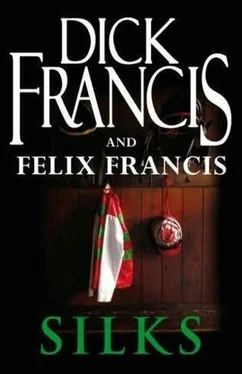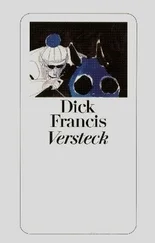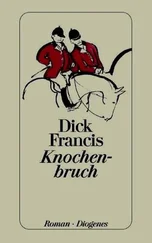I had thought that it would be counter-productive to say that I knew he had lied to me before, about the ending of his affair with Millie Barlow.
‘Don’t you realize the mess you are in?’ I’d shouted at him while banging on the grey metal table with my fist. ‘You’re facing a long stretch in prison for this. It’s not some game in the park, you know.’
‘I can’t,’ he had said finally.
‘Yes, you can,’ I’d screamed at him. ‘No one would expect you to keep quiet if it meant you would be convicted of a murder you didn’t do.’
‘It’s not that simple,’ he had said, looking down at the table.
‘Is she married?’ I had asked, guessing the reason.
‘Yes,’ he’d said emphatically. ‘And I don’t even think I was with her when that bastard Barlow got himself killed. It was only a last-minute lunchtime bonk, arranged when the racing at Ludlow was called off. I’m certainly not embroiling her in this mess when it wouldn’t even give me an alibi for the right time.’
The prosecution case was that Barlow had died sometime between two and four in the afternoon. His body had been discovered around six by a policeman responding to an anonymous call to Newbury police station’s front desk about an intruder at Honeysuckle Cottage. As the caller had used the local landline and not the emergency 999 service there had been no record of the telephone number or any recording of the conversation.
This fact was one of the few plus points for our side because, as I had pointed out in our Defence Case Statement, Mitchell was hardly likely to call the police if he had, in fact, murdered Barlow, and the prosecution case was that he had acted alone in the killing. It was a minor point in the face of the wealth of prosecution evidence, but one I planned to exploit to the full at the trial.
‘The fact that you were not alone all of the time from one o’clock until six might help to plant some doubt in the minds of the jury,’ I had told him. ‘And, at the moment, we need all the help we can get.’
‘She was gone by two thirty at the latest,’ he’d said. ‘So what difference would it make? Barlow’s bloody house is only ten minutes’ drive from mine. I could easily have been there well before three anyway so it’s not a bloody alibi.’ He’d paused. ‘No. I won’t get her involved.’
‘Tell me who it was,’ I had said to him. ‘Then I can ask her if she would be prepared to give a statement to the police.’
‘No,’ he had said. And he had been silent on the matter ever since.
I had also asked him about Millie Barlow and why he hadn’t told me about her death at our first meeting.
‘I didn’t think that it was that important,’ he’d said.
‘Of course it was important,’ I had shouted at him. ‘You tell me absolutely everything and I’ll decide whether it’s important or not.’
He had looked at me with big eyes, like a scolded puppy. ‘I’m in a bit of the shit here, aren’t I?’
‘Yes,’ I’d said. ‘Big shit.’
‘I didn’t do it, you know,’ he’d said mournfully.
‘Were you drunk that afternoon?’ I’d asked him. ‘Or high?’
‘Nothing like that,’ he’d replied quite sharply. ‘We’d had a bit of red wine, I suppose, but not more than a bottle. That’s why I stayed in after. Because I didn’t want to get done for drunken driving.’
Shame, I’d thought, being banged up for a bit of driving under the influence would have provided a cast-iron alibi for Barlow’s murder.
‘So did Barlow blame you for his sister’s suicide?’ I had asked him.
‘All the bloody time,’ he’d replied. ‘Kept going on and on about it. Called me a bloody murderer. I told him to shut up or I’d bloody murder him.’ Steve had suddenly stopped and he had looked up at my face. ‘But I didn’t, I promise you I didn’t.’ He had then buried his head in his hands and begun to sob.
‘It’s all right, Steve,’ I’d said, trying to reassure him. ‘I know you didn’t do it.’
He had looked back at my face. ‘How do you know? How can you be sure?’
‘I just am,’ I’d said.
‘Convince the bloody jury then.’
Maybe that is what I should do, I thought, sitting here at my desk. Perhaps I should tell the jury that I had been threatened to make sure I lost in court. That was it. I must tell Sir James that I had been approached and intimidated. Then I could become a witness instead of a barrister in the case and I could tell the jury all about baseball bats and Julian Trent. But would that be enough to help Steve? Probably not. The judge might not even allow testimony concerning intimidation of one of the lawyers to be admitted. It was hardly significant evidence in the case, irrespective of what I might think. It might just be relevant if the defence could use it as support for our belief that Steve was being framed. But in the face of the prosecution case, would the jury believe it?
And where would that leave me, I wondered. Did I just sit and wait to have my head smashed in and my balls cut off? And how about my elderly father in his holey green jumper? What danger would I be putting him in?
It seemed to me that the only solution to my multiple dilemmas was to discover who was intimidating me and then show that they were the true murderers of Scot Barlow, and to do it quickly, before any ‘next time’.
Simple, I thought. But where do I start?
Julian Trent. He must be the key.
The following morning, I didn’t tell Sir James Horley QC anything about intimidation, or anything about an encounter in the Sandown showers. He and I sat on one side of the table in the small conference room in the lower ground floor of chambers. Bruce Lygon sat opposite us. For two hours we had been once again going through every aspect of the prosecution case. We had received their secondary disclosure, but there was nothing new to help us.
The prosecution was required to disclose to the defence anything that they, or the police, had discovered which would assist us based on our Defence Case Statement. The response had been short but to the point. Their letter simply stated that they had no information other than that already disclosed in their primary disclosure and Statement of Case. We hadn’t really expected anything.
‘Are you sure that Mitchell shouldn’t plead guilty?’ said Sir James. ‘The case against him is very strong.’ I wondered, ungraciously, if Sir James liked the idea of a guilty plea to save him a courtroom loss. Maybe he was having second thoughts about taking this case.
‘He says he didn’t do it,’ I said. ‘He’s adamant that he will not plead guilty to something he didn’t do.’
‘How about a plea based on a lesser charge?’ said Bruce. ‘Or on diminished responsibility, or temporary insanity.’
Insanity was right, I thought. They were clutching at straws.
‘Our defence is that our client didn’t do it and is being framed, so we shall have no guilty pleas to anything, OK?’ I said firmly.
‘Then we had better find out who’s framing him,’ said Sir James. ‘Otherwise we shall have egg on our faces. Trial date is set for the second week in May at Oxford. That’s eight weeks from now. I suggest we meet again in two weeks to see if we are any further on.’ He stood up and tied the papers together with ribbon and bows, as if they were Christmas presents. The ribbon was pink. Pink for defence. Prosecution briefs were tied up in white ribbon.
Papers so tied could not be looked at by any member of chambers except those acting for the appropriate side in that case. It was not unusual for different counsel within chambers to be acting for both sides in the same trial. I had once been prosecuting an armed robbery case while a colleague who normally shared the same room as me was acting for the defendant. We had temporarily been separated to opposite ends of the building, but we still needed to be very careful not to discuss aspects of the trial in the other’s hearing. Arthur had even installed segregated photocopiers so that a document carelessly left in one machine would not fall into the other camp’s hands.
Читать дальше












